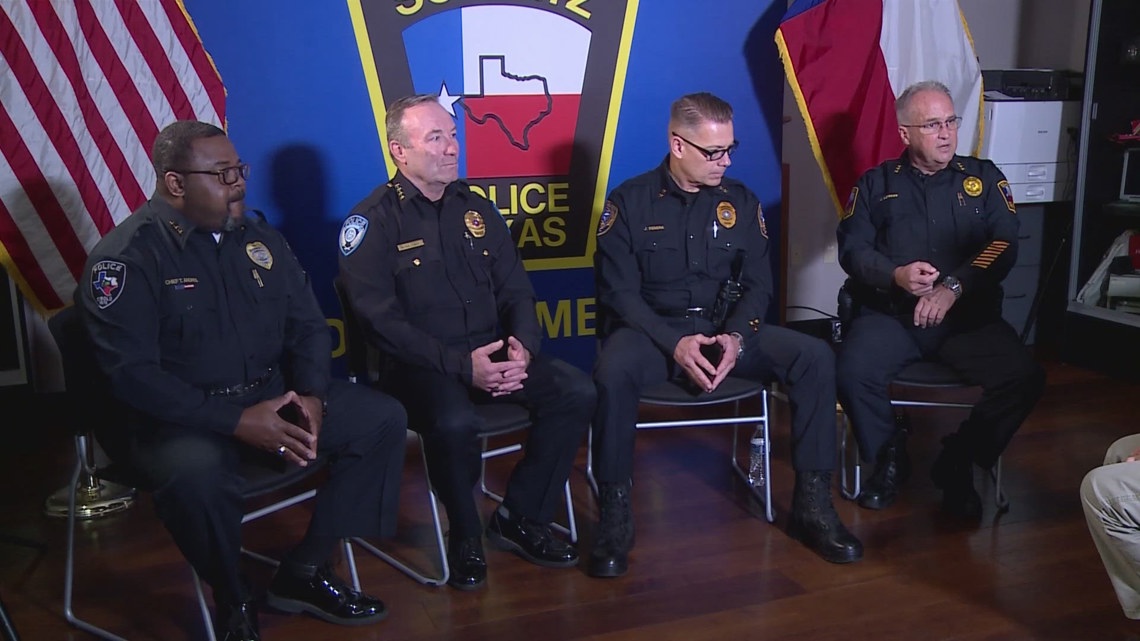
Police chiefs emphasize the importance of collaboration in handling mental health crises, advocating for medical intervention over arrests.
BEXAR COUNTY, Texas — It is a dangerous trend, according to the people who are trying their best to stop the shootings.
Police say violent incidents involving people experiencing mental health crises are up around the area.
In January, seven San Antonio police officers were shot by a man who was the subject of a family violence protective order who had been experiencing a mental health breakdown.
In February, in Schertz, an armed man who police said was hallucinating, was accused of shooting up a neighborhood until police were able to disarm him.
Schertz Police Chief Jim Lowery, whose officers had taken the accused man in for a mental health evaluation hours before the attack, said “I think it’s important to kind of set a foundation that lets everybody know that mental crisis and people with mental health is really not a law enforcement issue.”
While acknowledging law enforcement is an important partner, Lowery said “There are other stakeholders that have actually a bigger part in this…and once we take somebody into protective custody, it now becomes another stakeholder’s responsibility.”
Recognizing the challenge, four local police chiefs gathered for a discussion about what they want people to know and what can be done to improve outcomes for everyone.
Chief Johnny Siemens of Universal City said while crisis intervention training for officers has increased dramatically over the years, it’s important to recognize solving these complicated scenarios takes time.
“We want our officers exercising discretion in those instances as well. Just because you can be statutorily right, doesn’t make it morally or ethically right,” Siemens said. “We want them being problem solvers and not just call takers and so a lot of time is invested in these types of calls.”
Converse Police Chief Bobby Lane added, “One thing that it’s really important to understand is that the person is not a criminal, they’re a patient, they’re dealing with a medical episode.”
Lane said while officers try to deescalate tense situations, arresting a person in crisis is often not the right answer.
Lane said the goal is to get the person to appropriate medical intervention.
“That person is not under arrest, although there’s handcuffs still used, that’s for protection of the officer, protection of the patient, but they’re not being placed under arrest. It is protective custody,” Lane said.
Chief Thedrick Andres of Cibolo echoed the concerns.
“I think at the end of the day the ultimate goal is to make sure that they are cared for, make sure that their needs are met so that when we return to community they can be productive in our community…especially in the city of Cibolo because we want the best outcomes for them,” Andres said.
Siemens said less than 25% of the responses to these types of calls in Universal City result in emergency detentions.
The rate is about 16% in Schertz, according to Lowery.
“Across the board our people do great work,” Lowery said.
Siemens said when they have been able to establish trust with families, repeat calls for problems decrease.
“Our calls to those homes have gone down. The re-visits to those homes that used to require a lot of resources are less,” Siemens said.
All the chiefs agree building relationships with people who want help makes a huge difference.
“I want to make it crystal clear. Every person who has the courage to say I need help? I don’t want to stop them,” Lowery said. “We all want them to call.”
They say oftentimes, if the person doesn’t seem to be a danger to themselves or others when they are evaluated by professionals, they can be released.
Andres said real progress will be made when all stakeholders come together to work on better solutions.
“We have to have continuing conversations, having the right stakeholders at the table, continuing to train our officers because they are truly compassionate about wanting to help,” Andres said. “It’s now something that’s at the top of all of our agendas.”
STRAC or the Southwest Texas Regional Advisory Council is a collaborative group whose members help coordinate health and safety issues across our region.
They have produced a very helpful video that goes into detail about how the emergency detention process for mental health incidents works. The chiefs hope everyone will watch and learn and maybe even join the conversation about solutions to the challenges we all share.
This important topic impacts so many families and lives are often on the line, so if you want to know more about how things work, the entire conversation with the chiefs is available for viewing that you can access any time!
It’s 30 minutes of vital information to help keep your loved ones safe.
